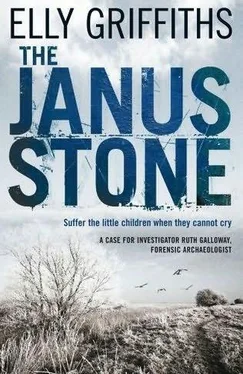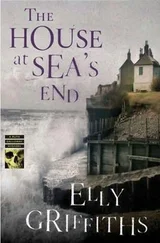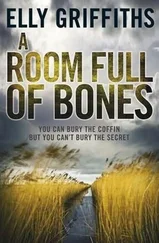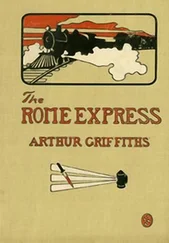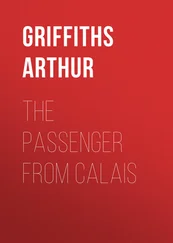‘Oh well.’ Clough stands up, brushing crumbs from his chinos (like Nelson, he wears plain clothes – very plain in Nelson’s case). ‘Better get back to the ranch. No peace for the wicked.’
A cliché, like many of Clough’s utterances but as Ruth goes back to work in her trench she finds the phrase reverberating in her mind. No peace for the wicked. Were these bones at peace? Is she now disturbing them? Did something wicked happen here, however many years ago? Did somebody kill this child? And what about the cat?
No peace for the wicked. Cathbad would say that places retain memories of evil. This site is spooky enough, with its half-ruined Gothic walls, its grandiose arch, the staircases and doors leading to nowhere. Cathbad would also say that Ruth should be careful, disturbing the dead, meddling with the past. But that is her job. She is a forensic archaeologist. It is her job to excavate the body and discover clues from the bones, from the burial, from the very texture of the earth. It is all very straightforward and there is nothing to get excited about.
Nevertheless, when the light starts to fade and Ted and Trace pack up their tools, Ruth goes with them. Being sensible is one thing; staying on the site after dark is another.
‘So you were resident at the Sacred Heart Children’s Home for how long?’
‘Three years. I came when I was thirteen. I left when I was sixteen. Father Hennessey got me an apprenticeship. I owe him everything really.’
The speaker, a mild-looking man in his forties, looks at Nelson and smiles. Nelson forces himself to smile back. This is the third ex-resident of the children’s home who has offered an unsolicited testimonial to the kindness of Father Hennessey. As Clough put it, half an hour ago, ‘perhaps the buggers have been brainwashed.’
While Nelson and Clough are interviewing former residents of the children’s home, Detective Constable Judy Johnson, another of Nelson’s team, is on her way to interview Sister Immaculata, a nun who used to work at the home and is now in a Southport old people’s home. As Nelson hates Southport and Clough hates nuns, it was considered that this visit needed ‘a woman’s touch’.
‘Mr Davies,’ Nelson leans forward, ‘during your time at the home was there any ill-treatment of inmates… sorry, residents.’
‘No, never,’ Davies answers. Too quickly? wonders Nelson.
‘No corporal punishment?’ asks Clough. ‘Quite common in the seventies.’
‘No,’ says Davies quietly, ‘Father Hennessey believed in kindness.’
‘What about the nuns? The sisters. Could they be strict?’
Davies considers. ‘They could be strict, yes. No physical violence but some of them had sharp tongues. A few were kind. Sister James. Sister Immaculata. But some of the others… they were good women but not kindly women, if you know what I mean.’
‘So what were the punishments for bad behaviour?’ persists Nelson.
Davies smiles. ‘Well, for really bad behaviour you got sent to Father Hennessey but that usually turned out to be more of a treat than anything else. He’d get you to help clear out his cupboards or weed the kitchen garden. Some of my happiest memories of SHCH are of working on that garden.’
Nelson sighs and changes tack. ‘Did you know two children called Black? Martin and Elizabeth Black.’
Davies frowns. He has an anxious, squashed-looking face at the best of times. Now his face is positively pleated in thought. ‘Yes,’ he says at last, ‘they went missing. It was just after I came to SHCH. Martin was about a year younger than me. He was very clever, I remember.’
‘Do you remember anything about their disappearance?’
‘Well, there was a big to-do at the time. We used to have a free hour at the end of the day and I remember that I’d actually been talking to Martin. There was a craze for collecting football cards and we were filling in our scrapbooks. Elizabeth was there too, playing with some stuffed animal. A dog, I think it was. She took it everywhere with her. After a while she wandered off and Martin went to find her. That was the last I saw of him. Then one of the sisters rang the bell for bedtime and they were nowhere to be seen.’
‘What happened next?’
‘Father Hennessey went out to search. Then he must have called the police. I remember being interviewed, being asked when I last saw Martin and Elizabeth. The police were around for a few weeks, asking everyone questions. I remember Sister Immaculata being angry because they interrupted us when we were saying the rosary. Then everything went back to normal. We still prayed for Martin and Elizabeth but we didn’t really talk about them. We forgot. You know what kids are like.’
‘When the police were at SHCH, do you remember them searching the grounds? Digging?’
‘No,’ says Davies slowly, ‘I don’t remember them digging.’
He looks up suddenly. ‘Is that what all this is about? Have you found a body?’
‘I’m not at liberty to say,’ says Nelson.
‘They’re knocking it down, aren’t they?’ says Davies. ‘I walked past the site the other day.’
‘They’re developing it, yes.’
‘It’s a shame. It was a lovely house. Like a mansion, I always thought.’
‘Yes.’ Nelson looks at Clough. ‘Mr Davies, would you be prepared to come to the site and look around? You might be able to tell us where things were. Which rooms were which, that sort of thing.’
‘Yes,’ says Davies, ‘I’d be happy to.’
He gets up to leave, shaking hands with both policemen. At the door, Clough asks, ‘You say Father Hennessey got you an apprenticeship. What trade was that?’
Kevin Davies smiles, the creases in his face turning upwards. ‘Oh, I thought you knew. I’m an undertaker.’
Judy Johnson is pushing a wheelchair along Southport seafront. The tide is out and the sand stretches into the far distance, bands of gold and white and silver, dotted with tiny figures carrying nets and buckets. As she watches, three racehorses canter into view, their necks arching as they fight their bits, the sand flying up behind them. Judy stops for a second and Sister Immaculata turns and says, ‘Red Rum was trained here. Did you know that?’
‘No.’
‘I had a bet on him in 1976. That was the year he came second. Typical.’
‘Was it each way?’ asks Judy, a bookie’s daughter.
‘No, on the nose. Typical.’
The horses are galloping now, stretching out joyfully across the sand, manes and tails flying. The jockeys hover over their necks, seemingly balanced in mid-air. Judy had wanted to be a jockey once. Before she got interested in boys.
The old people’s home turns out to be a convent that looks after aging nuns. The sister in charge suggested that Judy take Sister Immaculata out ‘for a walk’.
‘That way she’ll get fresh air and you can have some privacy.’ A mixture of kindness and absolute authority that Judy remembers from her own (convent) schooldays.
Judy stops by a bench, puts the brakes on the wheelchair and goes to sit beside the elderly nun. She knows from the police records that Sister Immaculata (real name: Orla McKinley) is seventy-five but the veil covering her hair and her high-necked habit serve to mask the most obvious signs of age. Her face is curiously unlined, the blue eyes still sharp. Only the hand, pointing now at Southport Pier, betrays its owner’s age. It’s a mummy’s hand, skeletal and misshapen.
‘Sister Immaculata,’ begins Judy, ‘you worked at the Sacred Heart Children’s Home from 1960 to 1980.’
‘It wasn’t work, it was a vocation,’ says the nun sharply.
‘I’m sorry. But you were resident at the home?’
‘Yes.’
Читать дальше
